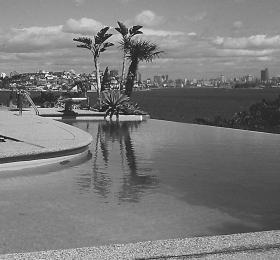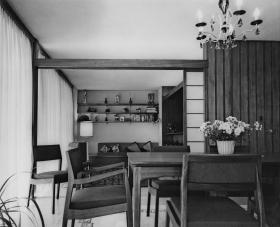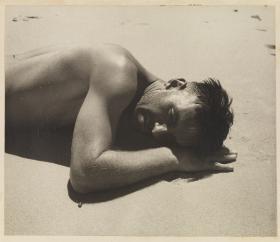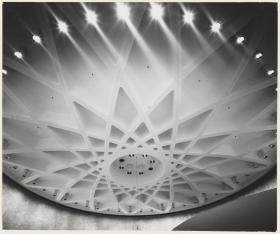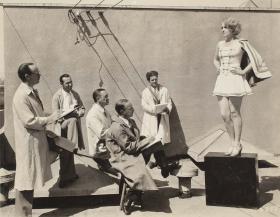English-born architect-designer Douglas Burrage Snelling (1916–1985) created more than 70 of Sydney’s superior modern residences, shops and commercial buildings while he lived here from 1940 to 1977. He also pursued a remarkable pan-Pacific career spanning graphics, furniture, interiors and landscape design, property development and communications, as well as collecting Cambodian antiquities and engaging in diplomacy.
One of his memorable contributions was to build at Vaucluse Australia’s first ‘infinity’ (spill-edge) swimming pool — a type which now epitomises luxurious waterside living around the world.
Snelling is the subject of my new book Douglas Snelling: Pan-Pacific Modern Design and Architecture (Routledge, 2017), which includes more than 150 architectural drawings, photographs (many by Max Dupain), and other images from the Library’s collection.
Snelling lived mainly in Bellevue Hill and circulated around prosperous Sydney society, but he was lowly born to a bootmaker and his wife in the dockside town of Gravesend, Kent, at the height of the First World War. He grew up in New Zealand between 1924 and 1940, then built his career in Sydney until his retirement to Honolulu in 1977. He worked twice in Los Angeles, in 1937–38 and 1947–48, built two substantial houses in Noumea, and designed several residential-retail schemes (unbuilt) for beachfront sites in Vanuatu and Fiji. He married three times, to glamorous heiresses Nancy Springhall, Patricia Gale (mother of his three sons and stepdaughter) and Marianne Sparre.
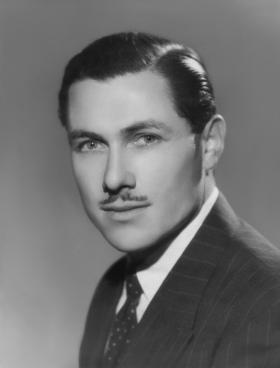
Snelling remains best-known for his timber-framed chairs with backs and seats of cross-woven webbing and his splay-leg timber tables and storage cabinets. The ‘Snelling line’, prototyped in 1945–46, was mass-produced until 1956 by Functional Products Pty Ltd, at a St Peters factory which Snelling designed and built in 1947.
Snelling chairs are archived in furniture collections at the National Gallery of Australia, the National Gallery of Victoria and the Museum of Applied Arts and Sciences, and have been identified among Australia’s great twentieth-century design icons.
Before Snelling chairs became popular for houses, they appeared in late-1940s Decoration and Glass magazine pictorials about his Sydney shops, offices, showrooms and restaurants — which included the Etam Glove Shop, American National Club, Dasi Pen Shop, Sydney Snow frock and children’s shoes salons, Vacuum Oil reception room, J Farren-Price jewellery store, and the California Chocolate Shop.
These interiors were strongly influenced by new American trends, illustrated in books like Emrich Nicholson’s 1945 survey of Contemporary Shops in the United States. Each space was a fantasy set — often involving dramatic up- and down-lighting, geometrically irregular fixtures, unusual colour and material palettes, and undulating walls and screens.
Snelling’s early interiors won him a job with Beverly Hills architects Douglas Honnold and John Lautner in 1947. During this second visit to California, he became inspired by Frank Lloyd Wright and his younger Los Angeles followers, including Richard Neutra, Harwell Hamilton Harris and Gordon Drake.
After Snelling returned to Sydney in 1948 — the same year that the architect Harry Seidler arrived — he rented a flat in Marlborough Hall, Roslyn Gardens, and began to convert his practice to architecture. First he designed some small, modular houses for North Shore sites. Two schemes (probably unbuilt) were published in John Entenza’s distinguished Californian magazine, Arts and Architecture, in 1949 and 1950.
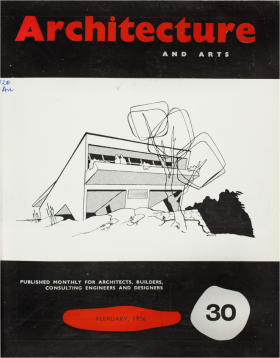
For four years, between 1948 and 1952, Snelling and Seidler were Sydney’s two most talented young, American-experienced leaders of the‘battle of the styles’ between organic modernists, led by Wright and his Finnish acolyte, Aalto, and followers of the ‘international style’, which had emerged in Europe after the First World War. Writing for London’s Architectural Review in 1951, Melbourne critic Robin Boyd claimed that the two ‘opposite’ aesthetic approaches were often blended by different architects to create ‘a new eclecticism’.
Snelling’s Sydney houses, immaculately photographed by Max Dupain, fit into three phases. The early organic works were strongly influenced by Wright and culminated in the palatial sandstone and cedar Kelly House 1 at Victoria Rd, Bellevue Hill, which won Melbourne magazine Architecture and Arts’ House of the Year Award for 1955.
His middle period produced Scandinavian-functional designs of pale, bland brick, culminating in two classic early 1960s blocks of units, Bibaringa in Double Bay and a block of bachelor flats at Roslyn Gardens. Both had beautiful water and rock gardens at their entrances, including his trademark shoals of koi carp.
In his third phase, he resorted to fantasies of primitive living on Pacific Islands — designing ostentatious rooflines emulating traditional thatched roofs found on the south-west Pacific islands of Sumatra and Vanuatu. Having lived in New Zealand as a child, Snelling was much more conscious of Polynesia and the Pacific than is usual for Australians.
Snelling’s Kelly House 2, Tahiti, at Vaucluse, and the Arthur F Little house, Yoorami, at Clareville, Pittwater, are Sydney’s finest examples of Snelling’s ‘islander style’ residences. These late-career houses predated many ‘indigenous modern’ Asia-Pacific luxury resorts, such as the entrepreneur Adrian Zecha’s Regent of Fiji and 1980s Aman Resorts.
Like his shops, all of Snelling’s central Sydney office buildings have been demolished. The most important were the mid-1950s Hartford Fire Insurance Building at 46 Margaret Street and the Liddle & Epstein office building at East Circular Quay. Both were bold modernist edifices replacing elaborate Victorian sandstone structures.
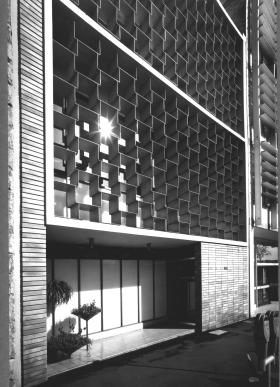
In 1977, shortly after the death of his second wife, Pat, Snelling and his three sons moved to Hawaii, where they lived in a resort-style house designed by his friend and Wrightian counterpart in Honolulu, Vladimir Ossipoff. After marrying Swedish artist Marianne Sparre in Honolulu in 1980, Snelling died on a visit to Sydney in late 1985.
Dr Davina Jackson is a Sydney author and curator. She is a visiting research fellow with Goldsmiths (computing), University of London, and has a PhD from the University of Kent for her architectural publications including her latest book, Douglas Snelling: Pan-Pacific Modern Design and Architecture (Routledge, 2017).

